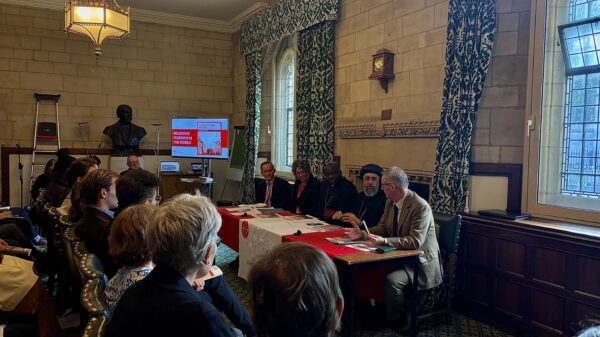Incoming Editor-in-Chief Sam McManus sits down with Liberal Democrat MP Josh Babarinde to discuss his fight for domestic abuse reform, personal experience of survivorhood, and the deeper purpose behind his campaign for a fairer justice system.
It’s past 8:20 pm. I’m standing at the back of a (rather depressing) classroom in Bush House, its rather hideous cross-cut grey carpet underfoot, sneaking glances at my watch. It’s Shrove Tuesday, and two miles away, I’m growing increasingly late for a planned pancake dinner with friends.
This interview should have started by now. In fact, it should have probably ended.
Between me and my guest are an assembly of figures, crowded around near the front of the room. The official event wrapped up 20 minutes ago, yet they linger, lobbing questions at the MP. But Josh Babarinde shows no sign of my impatience. He leans in, jots down notes, offers contact details, even scrolls for relevant links.
Eventually, with some assistance from the King’s College London Liberal Democrat Society President, the last of the crowd peel away. The man, donning a pear green suit and brown leather shoes, turns to me, still smiling.
An hour and a half previously, Josh Babarinde MP had strode into the room. Arriving for an event hosted by the KCL Lib Dems, he earns an early laugh by joking that, as a London School of Economics (LSE) graduate, he is deep in “enemy territory.”
The Liberal Democrats’ Justice Spokesperson launches into a PechaKucha (a punchy presentation format I was entirely unfamiliar with). 20 slides, each up for just a minute, as he sketches out his career and political mission.
For a man of 31, the CV is absurdly accomplished; OBE, Forbes 30 Under 30, a landslide entry into Parliament. He is quickly being tipped as a rising star of the party. Yet there’s no swagger, no self-importance, just a quiet assurance that suggests he’s only getting started.
Babarinde’s visit coincides with his new campaign to create a specific offence of domestic abuse in the law. Under current legislation, domestic abusers are charged with Actual Bodily Harm (ABH) or similar such offences, which makes them eligible for the government’s early release scheme, Labour’s answer to our overflowing prisons and waterlogged courts.
“My Bill looks to patch up a specific loophole in the law,” he exclaims, rushing over to his bag and presenting a thick wad of pages to the audience. He recalls earlier that day having attempted to charm Jess Phillips, Minister for Safeguarding and Violence Against Women, to back his changes, with his Change.org petition sitting at over 50,000 signatures. Did it work? “I hope so,” Babarinde says with a smile.
“There are lots of victims and survivors of domestic abuse who have been utterly let down by this government,” he continues. He references one such survivor, Elizabeth Hudson. Hudson’s ex-husband was jailed in 2023 after he held a knife to her throat and was convicted of ABH. The Ministry of Justice had written to Elizabeth to say that her abuser was eligible for release as early as Christmas of last year.
As the discussion broadens, Babarinde fields queries on crime, prisons, and whether Britain should copy the justice systems of other nations. “I’m all for nicking good ideas,” he grins. His viewpoint is clear: short prison sentences serve neither victim nor perpetrator. He argues for a shift towards community-based justice, a system that seeks to reform, rather than recycle offenders.
But if he believes that, where does he stand on early release? His campaign is a direct response to its consequences – domestic abusers walking free before their time is up. Had the government never introduced the policy, his bill might not be necessary at all. So, does he back it or not?
Babarinde disarms my question, with a voice soft and understanding, resembling a mix of a skilled academic, and a professional therapist.
“The pure existence of the government’s early release scheme is evidence of a broken criminal justice system,” he says. He laments how justice has been under-resourced, underfunded, and undervalued for too long. As for early release, “Things should never have got to that place in the first instance.”
The Liberal Democrats have a reputation for being the nice guys of British politics. Earnest, well-meaning, and unfailingly polite. But therein lies the problem.
Critics argue that their liberal idealism blinds them to the harsher realities of human nature, particularly when it comes to justice (see any Tory attack including ‘soft on crime’). With voters consistently backing tougher sentencing and more prisons, are the Lib Dems facing a disconnect with the public?
“I get the argument that folks feel like we need to build more and more prisons and more and more prison places, but that is not going to reduce victimhood alone,” Babarinde tells me. “It’s not going to be sufficient to address the issues in our criminal justice system and the issues in our society more widely.”
Babarinde hits his stride, rolling out statistics from memory. I get the sense he is well-rehearsed to respond to this line of questioning.
“Look at prisons. 80% of people who are in there are people who have offended before. 80% of people who go to prison reoffend within nine years. 58% of people who serve a short sentence go on to reoffend.“
Across our 20 minutes of roaming around all topical issues on justice, Babarinde remains fluent in his argument for a liberalised prison system – one shaped as much by experience as by ideology.
He was born and grew up in a council estate in Eastbourne (now his Parliamentary Constituency, a fact Babarinde fails to suppress his beam about), studying Government & Politics at the LSE.
He would go on to found ‘Cracked It’, a social enterprise that employs youth at risk and young ex-offenders, who are then trained to offer smart phone repair services. Babarinde chuckles when recalling bringing this most unlikely group of professionals into the US embassy to repair diplomats’ mobiles.
Recognition came quickly: an OBE, a Winston Churchill Fellowship, Forbes 30 Under 30, and Evening Standard’s Social Enterprise of the Year.
Then, in July, he flipped his hometown seat from Tory blue to Lib Dem gold with a majority of over 12,000, defeating his former school teacher in the process. By September, he was in the party’s frontbench team, facing off against the Shadow Justice Secretary, Robert Jenrick.
I seek to unveil the burning drive that must exist beneath the smooth exterior. One must be relentlessly ambitious to command such a CV by their early 30s. I try to tempt Babarinde to comment on a potential future leadership bid, but it is a futile exercise.
“I love my town. I haven’t done this to be an MP, I specifically wanted to represent my hometown.”
Surely, he is an exception in this case? Babarinde seems to agree. He needs no encouragement to name Nigel Farage in seeking to get elected “for a town that they just don’t give a shit about”. The Reform UK leader’s rare appearances in his Clacton constituency have been repeatedly ridiculed by his political opponents.
“Next time round, when his constituents are being presented with options about who’s going to be their best constituency MP, you’re putting your chances at risk. You can’t forget who’s put you there, and you’ve got to deliver for them.”
But what about those who betray more than just their constituents’ trust? In recent years, Parliament has seen its fair share of elected lawbreakers. Mike Amesbury remained a Labour MP whilst he was handed a 10-week prison sentence for punching a constituent, which he was later suspended for two years for.
Babarinde is unequivocal in his view. “If you’re an MP and you commit an offence like that, I mean, that’s not moral behaviour in any way, shape or form, it’s to be condemned completely.”
“That’s not becoming of a Member of Parliament. I’ve seen the video, and it’s pretty shocking.”
There are other Parliamentarians with criminal records that Babarinde holds beef with. James McMurdock draws fire for “basically beating up his ex-girlfriend”, and is accused of trying to “downplay the impact and significance of that.”
Herein reveals Babarinde’s personal philosophy as to what defines justice. It is not merely the time spent locked in a cell, but the moral repentance that must accompany it.
“It involves recognising the impact that that’s had on the victim, the survivor and wider society, and it involves making a commitment to not put anybody else and indeed themselves in that position again. Justice is a joint enterprise on the part of the state, but also on the part of the individual. And if both pieces of that puzzle aren’t there, then justice hasn’t been done.”
Midway through his PechaKucha, the tone shifts. As he lays out his case for the new domestic abuse law, Babarinde reveals that he is a survivor of domestic abuse. It is a brave display of personal vulnerability in an otherwise polished performance.
It reveals that justice is a deeply personal endeavour to the MP. In our conversation, the topic transitions from his thoughts on the Tate brothers as “disgusting”, and he pauses as I ask about his experience coming out as a male victim of domestic abuse.
“It’s really hard,” he admits.“But part of the answer is role models.” He speaks of former footballers who went public in 2016 about their childhood abuse at the hands of coaches. “I found that very, very powerful, and that very much moved me to reckon with, to engage with my experience of abuse when I was younger.”
“I’ve sorted it myself by standing up in the House of Commons and speaking about my experience, to the media, [and] to you.”
Babarinde flashes a smile for the first time since responding to the question, and the mood relaxes again. He noticeably cheers up. He recalls a group work programme with 11 other men who had been through similar hardship, where he explored different dimensions of survivorhood.
“I’m still in touch, and we’re in the WhatsApp group, and it’s been amazing. When I’ve been at Justice questions in the Commons and asking about support for survivors, seeing the WhatsApp group just go crazy with all these guys who mean a lot to me.”
Does he believe all male victims should speak out? “I’ve sought to try to challenge the stigma by speaking myself, but that’s a pretty big thing to do, and I certainly wouldn’t expect any and every survivor to do that. You’ve got to do what’s right for you, but it felt right for me to speak out as I have, so I’ll carry on doing so.”
—
As we exit Bush House, and step out into the brisk March evening air, we remain chatting. I keep badgering Babarinde about my ideas on justice, prisons. Just as he had with the gaggle of students before our interview, he treats me with the same genuine interest, undeterred by my political inexperience.
He watches, and I am proud to say, even entertains a few ideas. We depart, with the time now past 9pm, as the MP heads off to the pub with the Young Liberals.
I am struck by the authenticity of my interviewee. This is a man who spent the last decade employing ex-offenders, and has fought tirelessly for the protection of victims since his election.
Many politicians talk a good game on justice. Some push for tougher sentences, others for creative alternatives. But whatever your stance, it is hard to deny: Britain’s justice system is failing.
And perhaps, with people as committed as Josh Babarinde in Parliament, there’s a chance we might fix it.



















